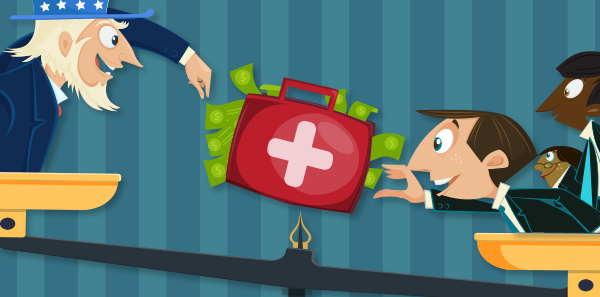
Now, Back to Single-Payer
Rather than argue with unverifiable “facts,” I will simply appeal to common sense.
Explore This Issue
ACEP Now: Vol 38 – No 10 – October 2019First, “single-payer” is not the same conversation as “universal health care.” I have been a proponent of universal health care (aka, equal access to health care) my entire career. Where I differ is in how to achieve universal health care, ie, how to fund it.
Single-payer may seem to make sense until you explain how it might work. In fact, much of the health care, insurance, and funding debate is steeped in ignorance. Most cannot even differentiate between health care and health insurance.
“Single-payer” is largely government-controlled and -funded health care (via taxes). The reason I am not in favor of this mechanism is the current state of government-run health care. As it stands now, publicly funded health care represents about 50 percent of current health care spending.5 Let’s break down how well these current government-run systems are doing:
Medicare: The trust fund is projected to be insolvent in 2026, three years earlier than predicted last year.6 While seniors tend to like Medicare, if you include the time value of money for the amount paid in Medicare taxes over a lifetime, plus the rising out-of-pocket cost, Medicare is more costly than private insurance (based on $150/month paid in Medicare taxes for 45 years, invested at 5 percent APR = ~$300,000 at age 65 divided by 25 years = ~$1,000 per month).
Medicaid: While most Medicaid enrollees are satisfied with their health care services, most Americans would not choose to be on Medicaid.7 And for this audience, how would you like for Medicaid to be your sole payer for the services you provide?
Indian Health Service (IHS): “Indian Health Service clinics don’t have enough doctors or nurses to provide quality and timely health care to American Indian and Alaska Native people. IHS data show an average vacancy rate for physicians, nurses, and other care providers of 25 percent.”8
VA: “[The Government Accountability Office (GAO)] designated VA health care as a high-risk area in 2015 due to five areas of concern regarding VA’s ability to provide timely access to safe, high-quality health care for veterans: (1) ambiguous policies and inconsistent processes; (2) inadequate oversight and accountability; (3) [information technology] challenges; (4) inadequate staff training; and (5) unclear resource needs and allocation priorities. In 2017, GAO reported that while VA had taken some actions to address these issues, little progress had actually been made.”9
Military Health System: “The Department of Defense faces significant challenges ensuring that all members of the military, as well as their families, receive appropriate health care for everything from general health and well-being to specialized clinical care for deployment related injuries such as amputations, chemically induced illnesses, and post-traumatic stress disorder…only 50-60% rate their health plan at 8/10 or better.”10
If the above were your résumé, you would be fired. But like many government-run services, health care is apparently good enough for government work. But the question we now face is, do we really want to turn over the remaining 50 percent of health care in America to the government, based on current evidence of mismanagement of the other 50 percent?
If we learn anything from the current silliness in American politics, it’s that we do not want politicians in charge of health care.
Pages: 1 2 3 4 | Single Page




No Responses to “Opinion: Single Payer Health Care Would Be Detrimental to Emergency Physicians”